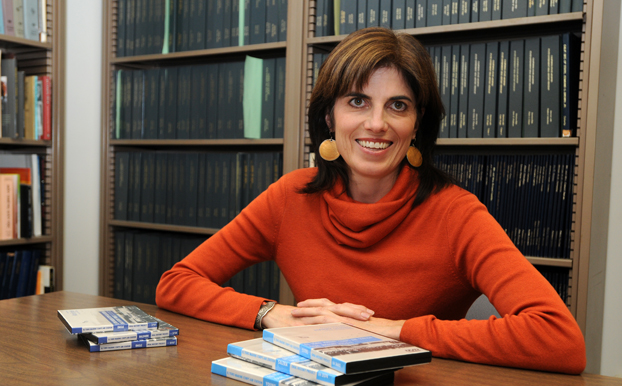 Caption: Natalie M. Fousekis, director of the Center for Oral and Public History. Photo: Karen Tapia Download Photo
Caption: Natalie M. Fousekis, director of the Center for Oral and Public History. Photo: Karen Tapia Download Photo
University Initiative: Bringing the Past to Life
NEH Grant Challenges COPH to Grow
Center Must Raise $1.3 Million to Match Grant and Expand Program
Dec. 19, 2011 :: No. 68
The National Endowment for the Humanities has awarded a $425,000 challenge grant to Cal State Fullerton to support the relocation and expansion of the Center for Oral and Public History.
Under the terms of the grant, NEH will contribute $1 for every $3 the university raises for the COPH expansion project over the next three years. The university must raise close to $1.3 million from other sources in order to receive the full $425,000. Plans are to raise a total of $3.5 million for the project.
The NEH grant is “a resounding vote of confidence in the Center for Oral and Public History,” noted National Humanities Medalist and American Academy of Arts and Sciences Fellow Jacquelyn Dowd Hall, former director of the Southern Oral History Program at the University of North Carolina at Chapel Hill.
“COPH already is among the best programs in the nation,” she said. “With this grant, it is poised to make a major leap forward. Once it has secured the archival and learning space it needs, it will be second to none in preserving the priceless stories of the past and pioneering new ways of using these stories in teaching and learning, both within and beyond the university.”
According to Natalie M. Fousekis, COPH director, the larger fundraising campaign already is under way, and with the additional funds, the center would relocate to the sixth floor of Pollak Library and double in size.
The new location will house a student project room for collaborative projects; a climate-controlled room for archival processing; a conference room for workshops and courses, which can double as exhibition space; offices for permanent and project-based staff; and an expanded reading room for students, community members and scholars.
COPH has undergone a transformation in the past decade, raising more than $800,000 in private support and grants, and another $150,000 in public grants and contracts for its exhibitions, public programs and oral history projects. In 2007, it added its first full-time archivist to serve the center’s growing collections and projects.
Since 2002, the center’s oral history courses have added more than 250 interviews on war and society, Cold War California, the European experience during World War II and grassroots politics. In 2007, COPH embarked on an ambitious project supported by the Orange County Great Park Corporation — the El Toro Marine Corps Air Station Oral History Project.
Today’s 5,600-sqaure-foot center is inadequate for the growing collection, Fousekis said.
“Our location limits our collection and preservation efforts and is a poor space to house project staff, interns, volunteers and the rapidly expanding body of students taking courses and serving as researchers and curators on our projects,” she said. “Moving COPH to the new space will allow the center to better carry out its humanities-based mission of collecting the important, individual stories of Southern California, educating its students in oral and public history and bringing these regional, national and global stories to the public.”
Fousekis said the center’s collection stands out nationally for its grassroots nature and the wide range of communities represented. Among the histories preserved in its collection are interviews with Japanese Americans interned during World War II, the first woman general in the Marine Corps, men and women who survived the Holocaust and the childhood friends and mentors of President Richard Nixon.
The new 10,709-square-foot space, Fousekis said, will allow the center to better execute its mission to:
- collect and preserve the stories of distinctive individuals and diverse communities whose historical experience have shaped the collective memory of Southern California, defined national and transnational identities, and reflect life in an era of globalization;
- train CSUF students in the methods of collecting oral histories, interpreting histories and presenting them as well as other important regional, national and global stories to the public; and
- initiate and collaborate on public history projects, particularly those designed to share oral histories with public audiences in Southern California and beyond.
Established in 1968 as the Oral History Program, the Center for Oral and Public History maintains more than 5,000 recorded interviews, as well as transcripts, photographs, documents and related materials. It is part of the College of Humanities and Social Sciences’ History Department.
The COPH oral history collection, she added “provides an important and unique window into American history and politics, as well as the relationship between diverse local communities and the wider world.”
“It tells the story of early Orange County and Southern California — a time before freeways, suburban sprawl and Disneyland. It also tells the stories of a region that is home to a rich, international community of immigrants from Latin America, Asia, Africa, the Middle East and Europe. The interviews share memories of the region’s powerful political figures, such as Richard Nixon, and the not-so-well-known Japanese American, Hispanic and white agricultural workers. There is no other collection of so many memories of Southern California in existence.”
Media Contacts:
Natalie M. Fousekis, History, 657-278-2763 or nfousekis@fullerton.edu
Mimi Ko Cruz, Public Affairs, 657-278-7586 or mkocruz@fullerton.edu
